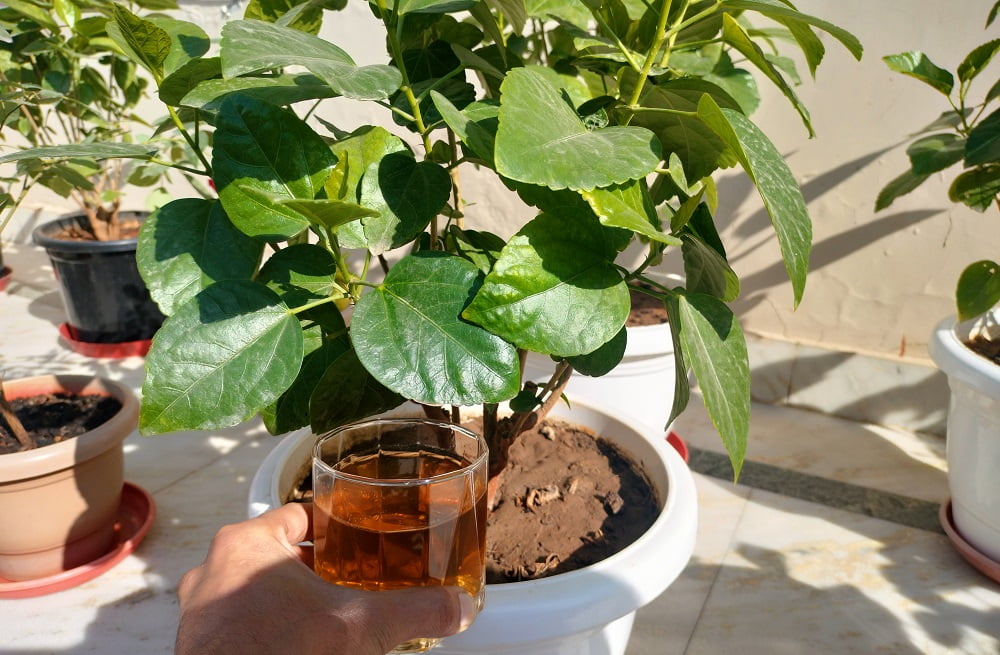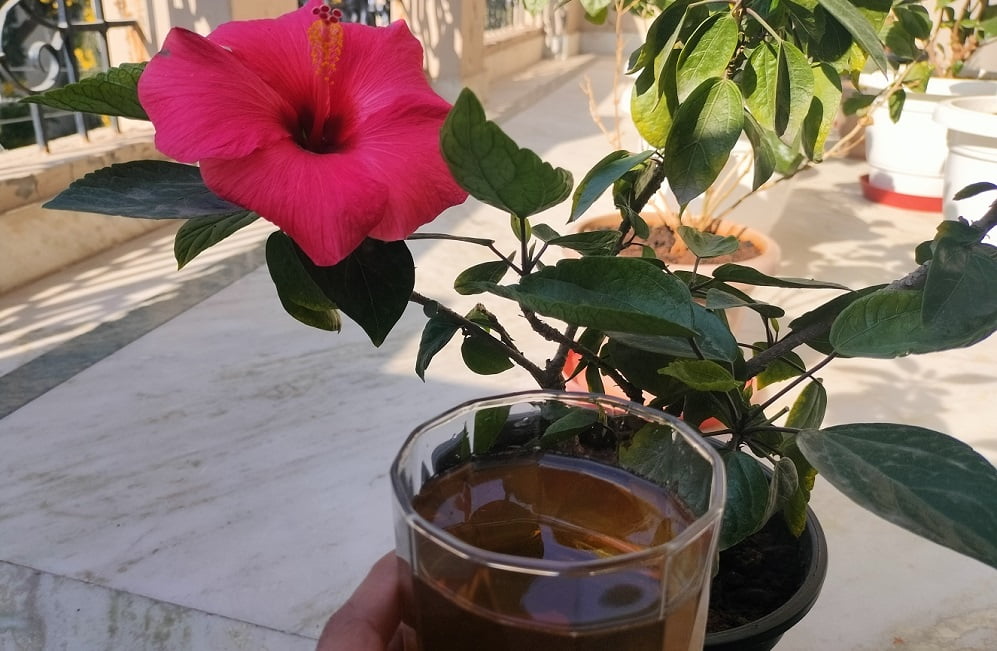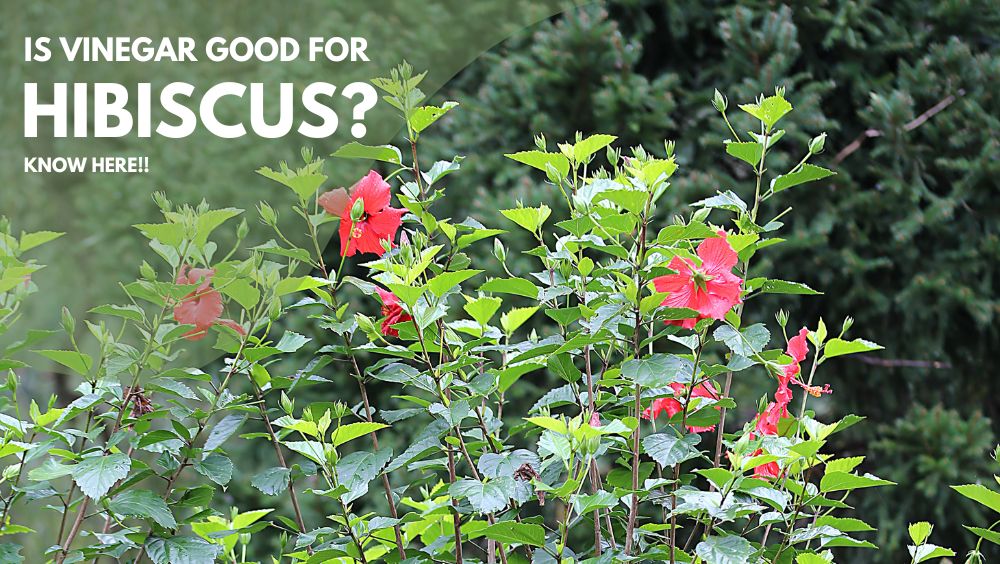
There are many organic products we all have at home that can be utilized for the well-being of Hibiscus. One such product that is most commonly consumed, and at the same time very easy to source, is vinegar.
Yes, you read it right! – Vinegar is an indispensable household product. It is essential not only for cooking or cleaning, but also for gardening. So don’t be surprised when I say that using vinegar in the garden goes far beyond weed control. In this post, I’ll show you how to use this amazing ingredient to make your Hibiscus bloom even more profusely!
Effects Of Vinegar On Hibiscus
Hibiscus prefers a humus and nutrient-rich soil that is well-hydrated. In addition, it prefers soil that is slightly acidic in nature in order to propagate and bloom in abundance.
When grown in either neutral or alkaline soils, Hibiscus often produces weak flowers and exhibits symptoms of withering.

Also, in calcium-rich soils where pH is over 6, many Hibiscus varieties react by developing yellow or brown leaves due to iron deficiency. This is because iron is not readily soluble in alkaline soils, so it cannot be absorbed by the roots of the plant. And thus, the leaves gradually tend to turn brown and die.
Vinegar is often considered the best home remedy for making the soil acidic. By adding just 1 teaspoon in 2 liters of water your soil will show positive effects by dropping the pH level significantly.
On top of that, organic vinegar contains traces of essential micronutrients (vitamins B and C), which are important for various metabolic processes, thereby promoting new shoots and buds.
Using Vinegar As Hibiscus Fertilizer
Hibiscus plant prefers soil that is slightly acidic so as to carry out its various metabolic processes. So, if you want to support plant growth and add acidity to the soil, it is ideal to use a highly diluted mixture of vinegar and water (1-2 teaspoon of vinegar in 2 liters of water depending on the pH of soil – use less if unsure).
However, this procedure should be carried out no more than once every four months. This is because the soil may otherwise become too acidic which could be detrimental to the plants.
If you want to be absolutely sure, you can do a pH test beforehand to check the acidity of the soil. Also, as a gardener, you need to consider whether the surrounding plants that share the garden soil can handle this acidification. After all, not every plant tolerates soil acidity equally well.
As a precaution, I suggest you first add vinegar on Hibiscus growing in pots or the ones that stand alone in the garden.
What Kind Of Vinegar Can I Use On Hibiscus Plant?
Almost any type of organic vinegar can be used for fertilization. However, while choosing one, you have to keep an eye on one thing – the percentage of acetic acid contained in the vinegar! So, be careful what you use on your hibiscus, because too much of it can be harmful.

To know this, rather than just looking at the brand name of the vinegar, you need to read the list of ingredients. The acidity of vinegar varies from 4 to 14%. So, vinegars with the lowest acid content are the safest to be used on Hibiscus (after diluting with water of course).
Besides, you have nothing to worry about if you use the ones with least amount of acetic acid, and you can proceed with the instructions mentioned here.
However, if the acetic acid content is high, you may need to dilute it more with water to reduce the acidity. So, if earlier you were diluting 1 teaspoon of vinegar containing 4% acetic acid in 2 liters of water, you would need to dilute it in 4 liters of water if the acetic acid content is 8%.
How Much Vinegar Can I Use In Hibiscus Garden?
- To enrich the soil by making it more acidic, it is advisable to dilute vinegar in water and pour it directly into the soil
- To do this, take 1 tablespoon of vinegar in 4 liters of water (or 1 teaspoon in 2 liters of water). Now, using a measuring cup, add equal amounts of this solution around each plant
- Note that the maximum dosage of 150 ml per plant should not be exceeded
- If you are using vinegar to disinfect garden tools, you do not need to dilute it, and you can apply it directly to a cloth with which you clean them
- Post which, you need to wash the tools with water and neutral soap to make sure no vinegar residue is left behind
- If you are using undiluted vinegar (without water) as insecticide, you should only apply it in a place where you do not want to plant anything, as the soil will remain highly acidic for some time
Can I Spray Vinegar On Hibiscus Leaves?
The answer is yes! It is perfectly fine to clean the leaves of Hibiscus with vinegar! This natural product not only removes dust, but also prevents any kind of mold, which over time makes the green leaves dull. However, for leaves, the mixture should be highly diluted. So, if you are using 1 teaspoon per 2 liters of water on soil, for leaves I would suggest reducing the concentration to half.
Post which, all you need to do is spray the mixture on the leaves and rinse with clean water after few hours. You can also use a microfiber cloth to give the leaves a metallic sheen.
Do note, it is not recommended to spray vinegar on Hibiscus flowers no matter how diluted your solution is. This is because the delicate petals can burn or develop unattractive stains due to the presence of acetic acid.
Does Vinegar Remove Aphids from Hibiscus?
Anyone who owns a garden of Hibiscus understands how these mesmerizing flowers can attract pollinators from every corner. Especially in spring and summer, you can see so many insects and aphids crawling around the leaves.
And not just Hibiscus, but also Roses, Chard, Angel’s Trumpet, Jasmine and Red Currants are readily attacked by these insects and aphids.
If your Hibiscus is weak or in the wrong location, this infestation will multiply quickly. This is where vinegar can quickly come to your rescue.
Vinegar is a natural insecticide and is very effective. The strong smell keeps pests such as aphids or white flies away from your beloved plant and thus prevents them from infestation.
And it’s worth noting that while vinegar spray is an effective method for repelling aphids, it does not harm beneficial insects like bees, butterflies, and especially ladybugs, which play a significant role in pollinating hibiscus plants.
To do this, simply spray the affected plants with a highly diluted water-vinegar mixture several times a week.
- If the Hibiscus is already infested with aphids, vinegar will help. Mix about 1 teaspoon of vinegar in 4 liters of water and apply several times a week.
- You can also add a little dishwashing liquid (2-3 drops) in case of severe aphid attack.
- Rinse the plants with fresh water after few hours to avoid leaf burn.
- Repeat this process again as and when required.
Advice- A lot depends on the right dosage! After all, you don’t want to spoil the plant with too much acetic acid. It is best to test the vinegar-water mixture on a small area of the leaf before spraying it on the entire plant.
Benefits Of Using Vinegar In Hibiscus Garden
- Vinegar is quite useful in gardening – be it little weeds that spoil the beauty or pests that lay down their eggs on the leaves. The acetic acid present in this ingredient works wonders in the garden.
- Vinegar also works miraculously against fungi. All you need to do is use it occasionally on the leaves till the time infestation subsides. This procedure can also be followed in case you observe continuous rainfall for many days which may trigger mold formation. Spraying diluted vinegar lowers the pH, which inhibits fungal growth.
- Hibiscus plant prefers an acidic soil, and this is where this organic product can be very effective. Just mix a teaspoon of vinegar in 2 liters of water and voila! Your plant will thank you with sumptuous blooms.
- If there are too many ants over your Hibiscus soil, you can use vinegar instead of using chemical insecticides. Just put some vinegar over the anthill and these tiny creatures will disappear forever.
- You can use vinegar as a fertilizer for potted plants to make them grow stronger and more attractive. And you will get great results in a really short time.
- Vinegar also works very well against rust, so it is ideal for cleaning garden tools: for instance, you can clean your garden shovel by rubbing a vinegar dipped cloth all over it. Plus, it can also be used to clean garden hoses that get covered in limestone.
- The intense smell of vinegar prevents cats and dogs from pooping around your Hibiscus.
- It promotes new growth in plants and removes harmful bacteria from the soil that may cause any infection.
- Hibiscus is lime intolerant, which is why it should not be watered with hard water in excess. Failing to do so can cause the plant’s leaves to suffer from chlorosis. Here, vinegar can be used to neutralize the lime content in soil and stabilize the pH level.
- Lastly, acetic acid in vinegar increases iron absorption. So, it is quite useful in case your Hibiscus is suffering from iron deficiency.
- Vinegar is quite useful in gardening – be it little weeds that spoil the beauty or pests that lay down their eggs on the leaves. The acetic acid present in this ingredient works wonders in the garden.
Bottom Line
Although the use of vinegar comes with many benefits not only for hibiscus, but for many other plants as well, you should first determine the pH of your garden soil before using it.
Doing so will give you an idea of how acidic or alkaline your soil is, and will help you determine whether or not your plant actually needs this ingredient.
Nature itself offers wonderful and inexpensive ways for sustainable gardening. As a gardener myself, I personally recommend that you should stick to these organic ingredients.
If you are looking for more natural ways to care for your plant, take a look at our article on the advantages of vermicomposting Hibiscus plants.
That’s all for now. Take care and happy gardening!❤️




